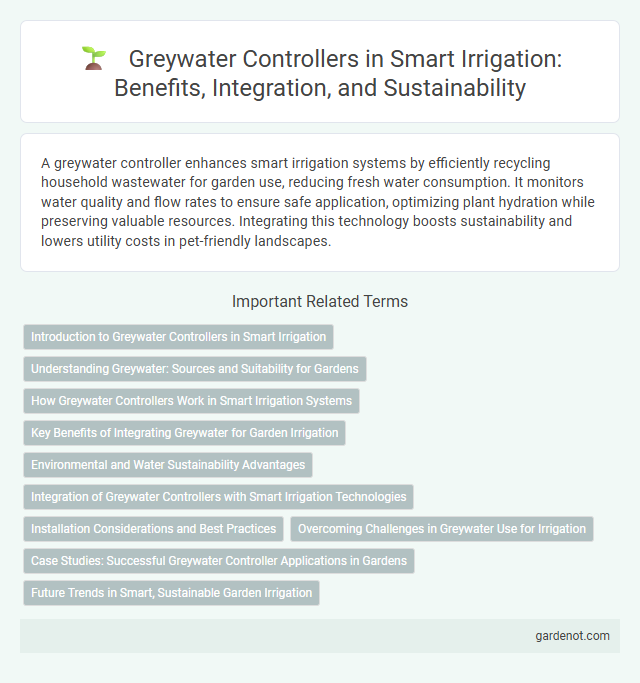A greywater controller enhances smart irrigation systems by efficiently recycling household wastewater for garden use, reducing fresh water consumption. It monitors water quality and flow rates to ensure safe application, optimizing plant hydration while preserving valuable resources. Integrating this technology boosts sustainability and lowers utility costs in pet-friendly landscapes.
Introduction to Greywater Controllers in Smart Irrigation
Greywater controllers optimize the reuse of household wastewater for irrigation, significantly reducing freshwater consumption in smart irrigation systems. These devices monitor and regulate greywater flow, ensuring plants receive appropriate moisture while preventing over-irrigation and system damage. Integrating greywater controllers with smart irrigation technology enhances water efficiency and supports sustainable landscape management.
Understanding Greywater: Sources and Suitability for Gardens
Greywater, originating from household sinks, showers, and laundry, is a valuable resource for smart irrigation systems due to its moderate nutrient content and lower contamination risk compared to blackwater. Understanding its chemical composition and microbial load is essential to ensure suitability for garden use, reducing the need for fresh water and enhancing sustainable landscaping practices. Proper greywater controllers regulate flow and filtration, optimizing irrigation efficiency while protecting plant health and soil quality.
How Greywater Controllers Work in Smart Irrigation Systems
Greywater controllers in smart irrigation systems efficiently redirect treated household wastewater to irrigate landscapes, reducing fresh water usage. These controllers use sensors and timers to regulate the flow based on soil moisture levels and plant water requirements, ensuring precise irrigation and preventing overwatering. Integration with smart home networks allows real-time monitoring and automation, optimizing water conservation and sustainability in urban landscaping.
Key Benefits of Integrating Greywater for Garden Irrigation
Integrating a greywater controller for garden irrigation significantly conserves freshwater by recycling water from household sources like sinks and showers, reducing overall water consumption by up to 50%. This sustainable approach minimizes the strain on municipal water supplies and lowers water bills, making it economically advantageous. Efficient greywater systems enhance soil moisture levels, promoting healthier plant growth while reducing the need for chemical fertilizers.
Environmental and Water Sustainability Advantages
Greywater controllers optimize water recycling by diverting treated household wastewater for irrigation, significantly reducing freshwater consumption and alleviating pressure on municipal water supplies. Utilizing greywater for landscape irrigation decreases runoff and groundwater contamination, promoting soil health and preserving local ecosystems. This sustainable practice supports water conservation goals while lowering utility costs and minimizing environmental impact.
Integration of Greywater Controllers with Smart Irrigation Technologies
Greywater controllers seamlessly integrate with smart irrigation technologies by automating the reuse of treated household wastewater for landscape irrigation, reducing freshwater consumption by up to 50%. These systems utilize IoT sensors and real-time data analytics to monitor soil moisture, weather conditions, and greywater quality, ensuring efficient and safe water distribution. Integration with platforms like MQTT or Zigbee enables centralized control and optimization, enhancing sustainability in residential and commercial irrigation practices.
Installation Considerations and Best Practices
Installing a greywater controller for smart irrigation requires ensuring compatibility with existing plumbing systems and adherence to local regulations to prevent contamination. Best practices include positioning the controller near the greywater source for efficient flow, integrating filtration to protect irrigation equipment, and scheduling maintenance to monitor water quality and system performance. Proper installation enhances water reuse efficiency, reduces potable water consumption, and supports sustainable landscape irrigation.
Overcoming Challenges in Greywater Use for Irrigation
Greywater controllers optimize the safe reuse of household wastewater by regulating filtration and flow rates, addressing common challenges like clogging and pathogen risks. Advanced sensors and automated control systems ensure consistent irrigation without soil saturation or nutrient imbalance. Integrating these technologies improves water efficiency and supports sustainable landscaping practices.
Case Studies: Successful Greywater Controller Applications in Gardens
Greywater controllers have demonstrated significant water conservation benefits in residential and commercial garden irrigation by efficiently recycling household wastewater for plant watering. Case studies reveal that integrating greywater systems with smart irrigation controllers can reduce potable water usage by up to 50%, while maintaining optimal soil moisture levels for diverse garden types. These successful applications often incorporate sensor-based scheduling and real-time data analysis to adapt irrigation cycles based on greywater availability and garden needs.
Future Trends in Smart, Sustainable Garden Irrigation
Greywater controllers are revolutionizing smart irrigation by enabling the reuse of household wastewater for garden watering, significantly reducing freshwater consumption. Emerging technologies integrate AI-driven sensors and IoT platforms to optimize greywater application based on soil moisture, plant type, and weather conditions, enhancing sustainability and water efficiency. Future trends emphasize seamless connectivity and advanced data analytics to promote eco-friendly irrigation practices that conserve resources and support resilient urban landscaping.
Greywater controller Infographic

 gardenot.com
gardenot.com